Enjoyed reading this piece "Character Building" by Juliet Sutcliffe in The Guardian. It is about Juliet's experience of going through a Creative Writing MA course at East Anglia. Starting with enough skepticism about creative writing courses and their use, she concludes:
When I started at UEA I thought I would wholeheartedly recommend such an MA to anyone. Despite claims that all writing graduates are taught to churn out work in the same (ie the tutor's) style, nobody teaches much of anything at UEA. That's not a bad thing. But the MA is not an easy option. The sceptical journalist had it wrong: these courses are more likely to stop people writing than to foster wild fantasies about living off royalties.
An honest account. Read it here.
Sunday, October 30, 2005
Thursday, October 27, 2005
Blogging has its price
With Freedom Comes Responsibility
Gone are the days when one could say anything behind the anonymity of cyberspace and get away with it
Read my article on blogging in Asia in The Bangkok Times (October 25, 2005). Click over the heading to read it online.
Gone are the days when one could say anything behind the anonymity of cyberspace and get away with it
Read my article on blogging in Asia in The Bangkok Times (October 25, 2005). Click over the heading to read it online.
Tuesday, October 18, 2005
Troubled Paradise: Kunzru on Maldives, Deepika on Bali
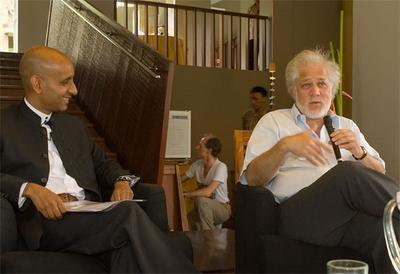
Novelist Hari Kunzru seems to have had a bad time in Maldives. He recently went to the tropical paradise to have a nice time in the sun and sand but came back home a lot more angry. He writes in The Guardian:
"'However,' the tourist board site goes on, 'there is more to the Maldives than just that.' Too bloody right there is, as I found out the other day when I attended a meeting of PEN, the writers' organisation that campaigns for freedom of expression, working with people around the world who've been imprisoned or otherwise abused for writing or saying things their authorities don't like."
At the meeting I heard reports of torture, imprisonment and disappearances in these 'paradise' islands..."
Bali was in news again for terrorist bombings for the second time. Another paradise in peril! But the people of Bali have decided to fight terror with books and literature. Deepika Shetty of Channel NewsAsia was in Bali recently to take part in the Ubud Readers and Writers Festival. She had a great time there, and in her report in Kitaab, she shares some interesting anecdotes about writers like Michael Ondaatjee and Nury Vittachi. Enjoy!
Monday, October 10, 2005
Crush on Krrish...Hrithik Roshan in Singapore
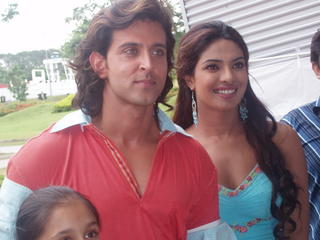
Anybody who reads newspapers in Singapore would know that Hrithik Roshan is in town with his helmsman father Rakesh Roshan to shoot Krrish, the sequel of his box office blockbuster, Koi Mil Gaya--a Bollywood reinterpretation of Spielberg's ET.
Hrithik is the name of a rush for Bollywood lovers. When he burst forth on the Hindi movie scene a couple of years ago with Kaho Na Pyar Hai, girls began swooning in the cinema halls and on meeting him in person. He became a superstar, challenging the three Khans--Shahrukh, Salman and Amir Khan-- who have been ruling Bollywood for more than a decade now. But soon, his films began to tank at the box office (except Mission Kashmir) and his star power decreased. He emerged a winner again with his father's Koi Mil Gaya. Now he is working on the sequel of the film. He is also doing another film, Dhoom 2 in which he plays a negative character. He is, even now, one of the most powerful stars after Amitabh Bachchan and the three Khans. Saif Khan and Amitabh's son, Abhishek, can be called his competitors who have delivered many hits this year.
On my wife's insistence, I went to see Hrithik on the sets of Krrish. When we got wind of him, he was shooting at the Expo. When we reached there, the shooting was on. Hrithik, in an orange T-shirt over a light blue shirt and white sports trousers, was reviewing his action shots on a monitor. The crew was readying the lights to shoot a reaction shot of the heroine, Priyanka Chopra, a former Miss World. She was dressed in a greenish short dress and was supposed to clap at Hrithik after one of his heroic fights. Priyanka had to give about 10 retakes for a simple reaction shot. She was being directed by Rakesh and the action director Tony Chan (?). Hrithik had done his martial arts training in Hong Kong for this film. He had already suffered injuries shooting this film in Bombay. The film was also shot in Manali for forty days, revealed one of the crew members. It will be shot again in Mumbai and will be released in June 2006.
While the scene was being set up for Priyanka, Hrithik was getting his hair blow-dried and combed. He has grown long locks for the movie. When my dare-devil wife tried to take a picture of him from the front, he still getting his hair set, Hrithik got upset. "Excuse me," he said, a little loudly, bringing a large mirror in front of his face as a cover. "Ok, ok, no problems," said my wife and moved on. She had already taken his photo.
After Priyanka's take, the crew broke for lunch. The director, the stars, the ADs, and chief technicians ate their lunch together on a makeshift dinining table. The rest of the crew sat on the floor, here and there, and had their grub, complaining about the food. Maybe they were missing their Bombay food.
Many fans had assembled by then. They all wanted to photograph Hrithik and get themselves photographed with him. Post-lunch, a lady with a child began to shoot a video of Hrithik from afar. He was still sitting around the dining table with Priyanka when he noticed this. He immediately sent an emissary asking the lady not to videograph him. He was polite though.
In the next few minutes, Hrithik allowed people to have a contact session. The crowd jumped at him--kids, men, girls and aunties. For about five minutes, everyone got a chance to get a picture with Hrithik and Priyanka. It was an amazing moment. I had never seen fans mob a star before, and it all felt so surreal. The stars who were, till a few minutes ago, not even looking at the bystanders, were now all smiles for the cameras. That is showbiz.
I shot my wife beside Hrithik and Priyanka too. Her pilgrimage was over. We returned home.
On the way, my wife asked me: "Why didn't you get photographed with Htrithik and Priyanka?"
"Because I am not star struck," I said.
In fact, I was. Maybe only a little but I sure was. I was crazy about Bollywood stars, my demigods, when I was a kid. With time, the charm of Bollywood has worn off. And so has the magnetism of Bollywood stars for me. My demigods have changed.
Rushdie and Zadie
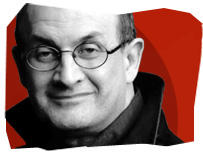
"The great silliness in the name of quality fiction"
Salman Rushdie, being what he is, is still being reviewed on the pages of lit mags. People are reviewing not only Shalimar The Clown but also judging and reassessing Rushdie as a storyteller, and what kind of road he (his pen) has taken since he became famous after the fatwa. Since his novel is out of the Booker race, it has become easier for the critics to rip apart the master. Surprisingly, I have not seen as many reviews of Coetzee's The Slow Man as of Rushdie's Shalimar The Clown. I don't understand why.
In the London Review of Books, Theo Tait writes about Rushdie's novel where he devotes the first three paragraphs discussing magic realism and how irrelevant it has become today:
With time and overuse, artistic style degenerates into mannerism. This is especially true of magic realism. Following the success of Gabriel García Márquez, a flood of semi-supernatural sagas was released all over the world – full of omens, prodigies, legendary feats, hallucinatory exaggerations, fairytale motifs, strange coincidences and overdeveloped sense-organs (all accepted placidly by their characters as part of the everyday run of things). Wonder and novelty were always an important part of its appeal, so the style had a built-in obsolescence: the decline into artificial gesture and cheap exoticism was inevitable (especially when British writers imitated South Americans, as they often used to do in the 1980s and 1990s).
The other problem with the style is its tendency to degenerate into a cosy and narrowly illustrative form of fiction, full of operatic clichés: passionate lovers, wise old women, tyrannical patriarchs – a sort of politically correct fairytale. Again, this is especially true of its anglophone variants: see the tedious fables of Jeanette Winterson, or the eccentric but warm-hearted villagers of Louis de Bernières.
These days, magic realism is deservedly out of fashion. But it’s worth remembering that it has been one of the great styles of the last fifty years...
He concludes by saying this: Shalimar the Clown will tell many readers that the recent history of Kashmir is a both a terrible tragedy and a fault-line in the modern world, which we ought to know about. This must be a good thing. But it is also a powerful testament to something completely different: the great sillinesses that are perpetrated in the name of quality fiction.
A thing of beauty
The opposite has happened in the case of Zadie Smith. With her On Beauty's inclusion in the Booker longlist, she has been winning rave reviews all over (I'm not saying it is because of that nomination). I am not going to discuss the merits of her latest novel here but it seems that the Booker nomination has done her book a lot of good. Remember, her novel was released later and had already got longlisted before it appeared in the market. In Rushdie's case, the book had come weeks before the nomination and many had already trashed it in the media.
Anyway, Frank Kermode has given her novel a balanced thumbs up in the same issue of LRB. He says:
What makes this novel a bit unusual is that it is conceived as an act of homage to E.M. Forster, ‘to whom’, the author writes, ‘all my fiction is indebted, one way or the other’. The acknowledgment is obscure and ‘one way or the other’ could, but probably doesn’t, mean ‘both by attraction and repulsion’. To take as a model Howards End, a novel published in 1910, need not be a mere game or stunt, but it does tend to steal the limelight of critical attention.
Read the full review here.
Changing hands
I recently read in a London newspaper that the ownership of Granta has changed hands, and so has that of the Times Educational Supplement. One of the rumours is about the folding up of the Times Literary Supplement. It has about 30,000 subscribers only. It will either die or will undergo some changes. Only time will tell but they say change is the unchangeable law of nature.
India's Literary Fortunes: Of Hemingway, Dons and Dollars
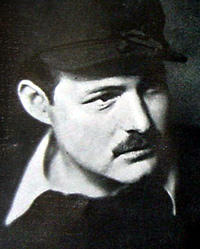 Hemingway and India?
Hemingway and India? There is hardly any connection, you'd say. Yes, that was right until now. Hemingway's last novel, Under Kilimanjaro, has an Indian character. I am yet to see the novel but I hope the Mr. Singh's role in this work will be better and meatier than the one played by Kabir Bedi (a bit role) in Out of Africa, a film based on the writings (and life) of Danish noblewoman and storyteller Karen ('Isak') Dinesen Blixen.
Here's the news: Under Kilimanjaro, Ernest Hemingway’s last novel that hit bookstores this month, has an Indian character.The 850-page manuscript was kept in a Cuban bank. It saw the light of day on September 27 — more than 44 years after Hemingway’s death in 1961.
Under Kilimanjaro, based on Hemingway’s experiences of an African safari months before he received the Nobel Prize in 1954, was released at a simple ceremony at Grand Forks in North Dakota, where its editor, Robert W Lewis, is based. For more, go here.
Million Dollar Baby
But here is a bigger news (thanks Kitabkhana) : Indian novelist, Vikram Chandra, has landed a million dollar deal for his new novel, featuring Inspector Sartaj Singh and the Mumbai underworld. The novel is 800 pages long. Now I know what Chandra was doing while his friend, and co-writer of Mission Kashmir, was penning his Maximum City.
Here is the news: "...The Commonwealth Prize-winner’s new novel—his third book—has earned a million-dollar advance, putting him in an exclusive club of Indian authors that includes Salman Rushdie, Vikram Seth and Arundhati Roy. "
"The yet-untitled oeuvre has been signed for $1.3 million for its USA and UK rights alone. “The Indian rights still have to be worked out,” he adds, speaking from his home in Berkeley, California. The book will be published by Harper Collins in the USA and Canada and Faber and Faber in the UK. "
Great news for Vikram. Three cheers!
For details, go here.
Mafia don's Unfinished Dream
A former mafia don, Babloo Srivastava who is based in India, is making his literary debut. Says the weekly, Tehelka: "...Babloo’s first shot at writing, Adhure Khwab, has created an enormous buzz even before the book hits the stands on his birthday, October 14. After all, Babloo is no ordinary man. This former Dawood aide, who ‘turned patriotic’ after the ’93 Mumbai blasts, now craves for the blood of ‘gaddar’ Dawood. That’s his khwab — to eliminate Dawood; that’s how the book got its name."
"Satish Verma, editor-publisher of Nai Sadi Prakashan believes that it was sheer good luck that he secured the rights for Babloo’s ‘crime thriller’ conceived behind bars. “The pre-publishing hype made me go for the book. After reading the draft, I was sure that it would be a rousing success. The deal was clinched in four sittings,” he says. The don gets 15 percent royalty on print order. The initial print order is of 20,000 at Rs 80 per copy; the contract is of 5 lakh copies or three years, whichever is earlier, subject to renewal."
For the writer-don, it is really going great guns! Is he going to be India's Chilly Palmer? Who knows, if Leonard Elmore read this news, his Chilly Palmer would sit down and write a bestseller, and in the process, straighten a few things out in the publishing world too. Leonard, are you reading? You don't need no research to write this one, I bet!
Ramazan Razzmatazz
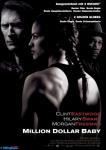 The holy month of Ramzan (Ramadhan) comes with its whole shebang of rules and rituals and cirumspects many of the liberties we (Muslims) take in life for granted. Sunrise and sunset become matters of faith, and time, suddenly measured in minutes and even seconds, acquires the power of dividing the line between hunger and bellyfullness. Working amid the ebb and tide of energy, sometimes the fasting stimulates fervent action by allowing utilisation of seemingly unlimited and uniterrupted supply of time and sometimes it enforces a sagacious laziness induced by a somnolent metabolism. We are at the mercy of the mood: heightened spirituality might sometimes puncture the alacrity to read and watch. And we yield oursleves to the demand of the moment. What esle can we do?
The holy month of Ramzan (Ramadhan) comes with its whole shebang of rules and rituals and cirumspects many of the liberties we (Muslims) take in life for granted. Sunrise and sunset become matters of faith, and time, suddenly measured in minutes and even seconds, acquires the power of dividing the line between hunger and bellyfullness. Working amid the ebb and tide of energy, sometimes the fasting stimulates fervent action by allowing utilisation of seemingly unlimited and uniterrupted supply of time and sometimes it enforces a sagacious laziness induced by a somnolent metabolism. We are at the mercy of the mood: heightened spirituality might sometimes puncture the alacrity to read and watch. And we yield oursleves to the demand of the moment. What esle can we do?I've been reading, between fasting and feasting, Suketu Mehta's Maximum City (I had been waiting for the paperback edition which is now out), a magnum opus on the tumultous Bomaby, Urbs Prima in Indis, and All the President's Men, Woodward and Bernstein's famous chronicle of the Watergate scandal. The latter is for a project that I am doing and the former, for sheer pleasure.
Mehta has written an eminently readable book, and if you want a fresh take on contemporary India, it's the book for you. I would go so far as to say that it is an update on Naipaul's A Million Mutinies Now, only it has much less stolidity and much more drollness. What more can you ask for in less than S$20? The most interesting chapters in the book, revealed so far to me during my random readings, are the ones on the beer bar girls and on Bollywood. Mehta has uncovered many of the shenanigans of Bollywood and the pirouetting secrets that makes its 3.5 billion global audience go mad about it. There are also stories about the mafia bullets that fly over Bollywood. It's a fascinating view of Bollywood that he had failed to give in an National Geographic cover story early this year. Now I understand why Vinod Chopra was mad at Mehta. You have to read the book to get all the juice.
I also watched a couple of movies on DVD that were on my list for a long time: The Man Who Shot Liberty Valance, Red River, Shane, Sunset Boulevard, Million Dollar Baby. In my humble opinion, The Man Who Shot Liberty Valance, is the classiest western I have ever seen. Red River was impressive, especially the relationship between John Wyne and Montgomery Clift, which was so much about love, defiance and the courage of conviction. Shane was ok but I guess it stands the test of time because of its essential humaneness: a stranger--a disavowed gunslinger--comes around to help and protect a loving family from the powerful rancher thugs. Once his job is done, he leaves for another place where he could help some other needy people. Shane is the quintessential do-gooder, the Gandhi with a gun.
Sunset Boulevard is, of course, in a league of its own. What interested me most, in fact more than the angle on the life of a fading silent-era film star and themes of love, jealousy, fame, and the cruel ways of the world, was the angle on the frustrated and hapless writer. I don't view myself as a pessimistic person but I can't help thinking that it has captured the essence of being a writer, especially a failed and out-of-favour writer. The screenwriter's death, the opening and closing sequence of the film--the rest in flashback, is a sad reminder to all writers of their fate if they ever ran out of luck. The difference between success and failure can be as grim as death.
Million Dollar Baby succeeded in stirring the right emotions, and tears, at the soulful moments. Clint Eastwood has helmed the movie with perfect elan, and a certain sophistication of understanding and represting the human condition is writ on every frame of this film. The best part was the voice over by Morgan Freeman who acts as the narrator of the film. This is not a movie to perk up your mood but it might reach your soul if you open yourself to it.
I also saw a movie in a multiplex: Into the Blue. No, this was not on my list. I just wanted to be entertained. In the past few months, Hollywood has become so infantile in its content and presentations that I had been left with little or no choice. I have been avoiding the theatres for months now as no Hollywood film was strong enough to rouse my interest. To cure myself of melancholia, when I stepped into the theatre, I was to choose among The Myth, Four Brothers, Dukes of Hazzard and Into the Blue. I finally settled for Into the Blue. If not a gripping story, at least Jessica Alba's curves could hold my attention. That was guaranteed and I got more than I had expected. But that is no compensation for a good story well told. No wonder Hollywood has its worst year in 2005 in the Asian market. Hollywood watch out! Don't forget that content is the king. I don't don't know how far King Kong can save it from an ignominious year at the box office. I have my doubts.
Subscribe to:
Posts (Atom)
